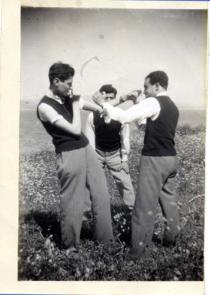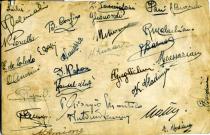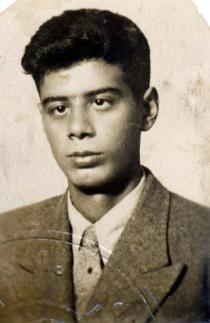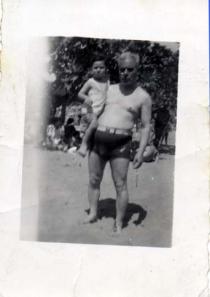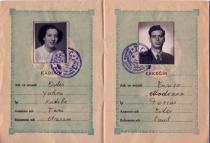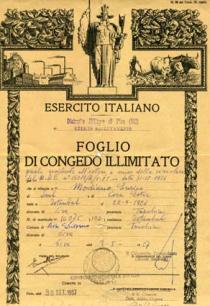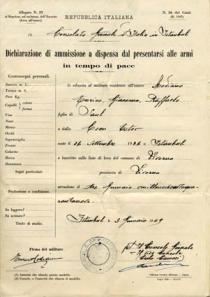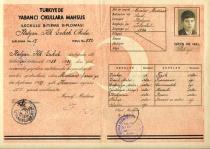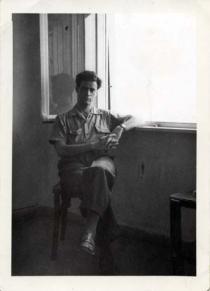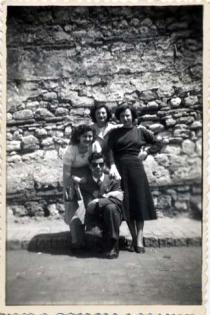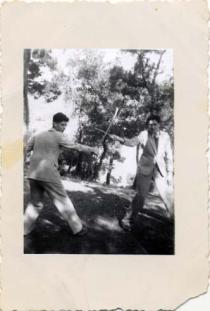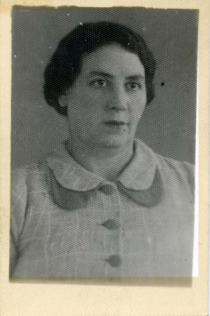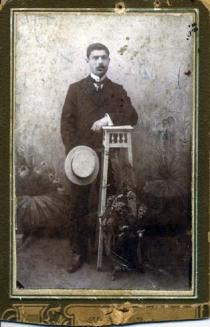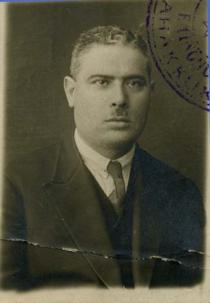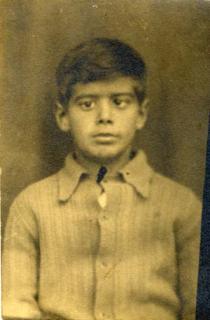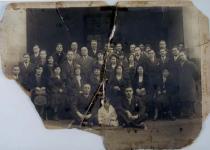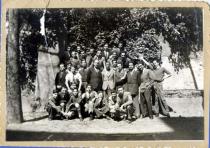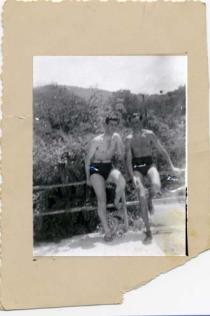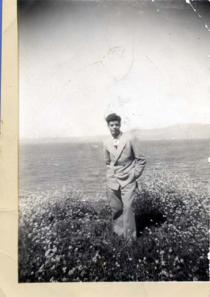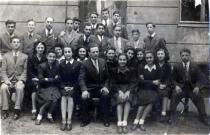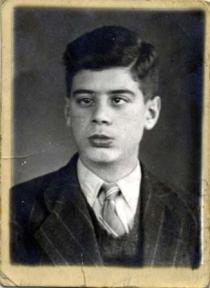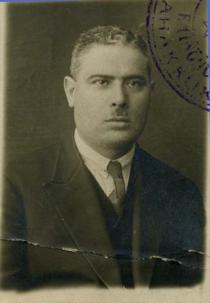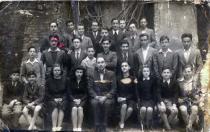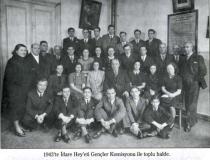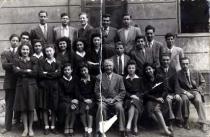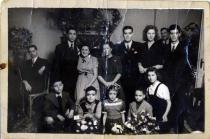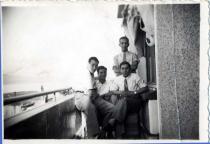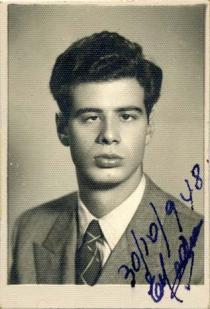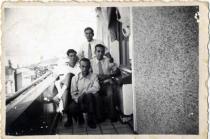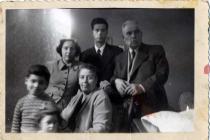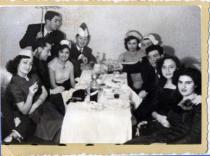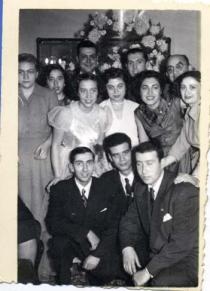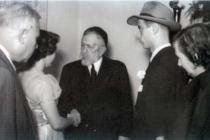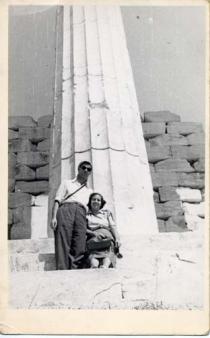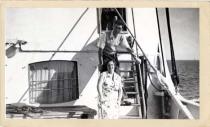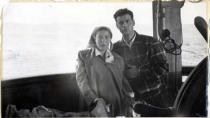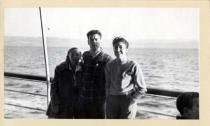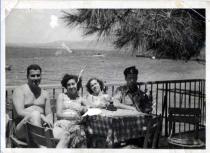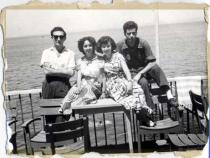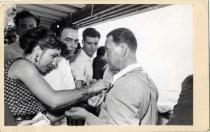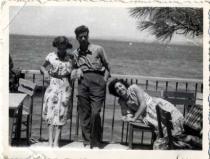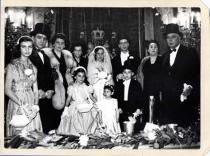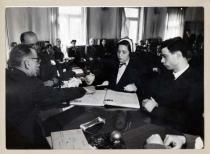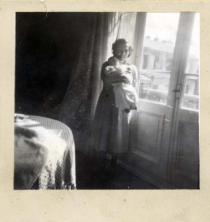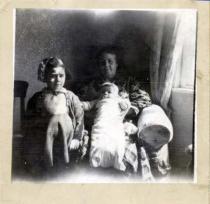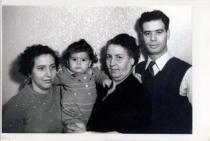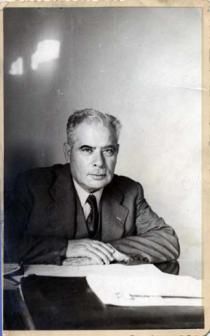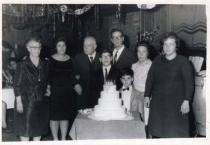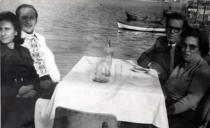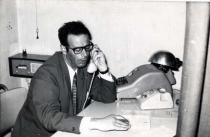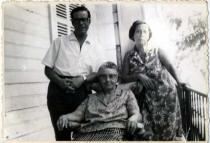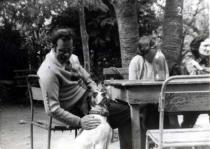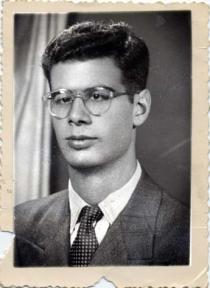
Enrico Modiano
Istanbul
Turkey
Interviewer: Rose Modiano
Date of Interview: May-July 2005
After his beloved wife Ester Modiano’s strange, tragic accident, Enrico Modiano tries to communicate with other people as much as he can – usually with a poignant smile on his face – and to go through this painful process as best as he can with patience and love. Enrico Modiano lives with his wife Ester in an apartment building named Edes (No.90) in Siracevizler, Sisli. He retired last year from the insurance business. He has an attendant helper, who comes over fives days a week to take care of the groceries, cleaning, etc. Every Saturday morning, Enrico Modiano goes to the synagogue for Shabbat prayers – except when the weather is terribly bad or if he experiences a health problem. When we look at his style of speech, he usually likes to stress on each and every word. For example, he stretches the word ‘1900.’. He is probably doing this to intrigue others or maybe to test their patience, because when you hear the beginning of the word, you start wondering if he means 1950 or 60 or something else. He likes using older Turkish vocabulary in his speech. Enrico Modiano is 79 years old. His outlook on life is one of hope even though he is experiencing some health problems. Although his wife - during her healthier days - was not too happy with his casual style of fashion, he prefers to wear both formal and casual clothing depending on the setting. He likes to listen to classical music with his wife as well as reading books about the Jewish religion and its history.
Family backgound
I know that my family is of Italian, Livorno origin, and that they had originally settled in Salonika. The name Modiano comes from Modigliona; it changed over time to Modiano, and has continued to this day. My great grandfathers knew both Italian and Ladino, but they often spoke Greek when they were living in Salonika. 1
I considered my paternal grandmother’s father, Gabriel Yakoel, as my own grandfather. He was a respected man in Salonika. He was a very good-hearted man. According to what my family told me, he even had a Midrash [small synagogue] in his name, and he used to open its doors to the public for worship during important Jewish holidays.
My paternal grandfather, Mario Modiano was born in Salonika in 1858. I never had the chance to meet him. He passed away at such a young age; my father and his brothers were just kids at the time. I believe my father was 9 when it happened. After my grandfather passed away, my grandmother had to take care of the family financially. She did get occasional financial support from relatives though. I also know that my father had to start working at a very young age in addition to going to school. I was told that my grandfather died in 1896, and that he was never interested in politics.
My paternal grandmother was Reyna Modiano. Her maiden name was Yakoel. She was an extremely tranquil-natured, introverted, respectable woman. She became a widow at a very young age, and took care of her daughter and three sons with utmost care and compassion. She also made sure to educate her children on appropriate manners of behavior.
I did not really see her so much as to remember her sense of fashion. This is because when I first met her, she was already in her 60’s. She was a house-wife; she did not go out much. She spoke only Ladino, and apparently the family also spoke to each other in Ladino. Family names have remained the same since then… I remember that my grandmother had beautiful, whitish hair that reminded me of a princess’s.
My grandmother first lived in the Beyoglu neighborhood in Istanbul, and then Taksim and Nisantasi. I remember having been to her houses in both Taksim and Nisantasi. She used to live with her daughter Ester Yakoel, who was single. The house my grandmother and Ester lived in during the ’50s and the ’60s was a big, comfortable place. They used a gas furnace for heating purposes, like most people did back then. I do not remember them ever having problems with running water. They did not have a garden.
I remember my father telling me about a 15-year old girl named Palomba Asayas. She was originally from Edirne [Andrinople, a city in the northwest of Turkey], and was adopted by my father’s family. In reality, it might not be correct to call her adopted, since adoption occurs when the person in question does not have parents. Palomba, however, did have a mother and a father. They were so poor that they lived in a broken-down house, and led a very difficult life. My father and his brother felt very sorry for the family, and offered to take her in. They took care of Palomba as if she were an adopted daughter or sister. She stayed with my father’s family until she got married. My father’s sister, Ester Yakoel, took care of the cooking for the entire family.
My paternal grandmother was born in Salonika, and lived there for a long time. She then moved to Istanbul, where her two sons, Gabriel and Isaac, lived. She did not read the newspaper much. She was not a very knowledgeable, educated woman. She deeply cared for her religion though; she always practiced and observed the rules of Jewish traditions. She kept Kosher, but did not go to the synagogue much – especially after moving to Istanbul. They usually celebrated Jewish holidays at home. She was extremely meticulous about food preparation during the Holidays. She had her own recipes for some foods and deserts. Every year, when Pesach approached, she would buy new sets of pots and pans from a month before, and would fill them with vinegar and peeled walnuts. A couple of days before Pesach eve, she would begin cooking a very specific kind of fish. I do not remember what it was called, but she served it to us every Pesach.
I remember my grandmother’s house in Nisantasi [a district in the European side of Istanbul]; it was a two-story house. She lived on the ground floor with her daughter. On the upper floor lived my grandmother’s brother Hayim Yakoel and his wife Loret. My grandmother did not have many friends, but her family visited often. She did not go on vacation much; she preferred to stay home most of the time.
She had one brother named Hayim Yakoel. Hayim was also born in Salonika, and went to school there. Actually, he was classmates with Ataturk. 2 When he later relocated to Istanbul, he worked at the Bank of Salonika for a while. He then began working at the Deutsche Bank as an accountant; he worked there until World War II, and hence, the Holocaust began. Unfortunately, he was intentionally fired from that job because he was Jewish. He was a very good accountant, and with the help of some of his friends, he was able to secure an accounting position at the Sultanahmet Vakko . He worked there until he retired. He has a son named Gaston Kohen. I still have many relatives today from Gaston’s family. One of my cousins from that side, for example, is Elyo Kohen. My parents did not give us a lot of information about their parents. My father, actually, does not remember too much about them and their elders.
My father had two brothers and one sister. He was the eldest of all siblings. The eldest son after my father was Gabriel Modiano. He was born in 1890. He was the Managing Director of the Bank of Salonika. He passed away in 1963. He was married to Eleonora Modiano. They had a son and a daughter together, both of whom lived in Italy. Actually their daughter, Linetta, still lives in Rome today. I occasionally speak to her on the phone. Gabriel and Eleonora’s son, Morio Modiano, passed away two years ago.
My father’s sister, Ester Modiano, was born in 1892. She passed away in Switzerland in 1982. She was married to Raphael Yacoel, and they had a son named Gabriel. I know that Gabriel has been living in Milan until recently, but we have not heard anything about him over the past couple of years.
My father’s youngest sibling, Isaac Modiano, was born in 1894. He was the Managing Director of the German Deutsche Oriente Bank’s Salonika branch. During the Second World War, he too was forced to resign from that post. Later on, he got a job at the newly founded Turkish Credit Bank as a Vice President. When the Bank became bankrupt, he decided to move to Switzerland. He had two daughters. One of them, Giovanna Modiano, unfortunately passed away at a very young age in 1984. She used to conduct academic research on law before passing away. Their other daughter, Renata Modiano, still lives in Switzerland today. She is a teacher of Italian Literature. Isaac Modiano passed away in Switzerland in 1985. He was married to Maria Pardo. Maria’s father, Josep Pardo, actually was Ismet Inonu’s French tutor. 3
My father, Saul Modiano, was born in Salonika in 1887. He passed away in Istanbul in 1970. My mother, Ester Modiano [her maiden name is Kohen] was also born in Salonika in 1894, and passed away in Istanbul, in 1979. My parents are both buried at the Italian-Jewish Cemetery in Sisli, Istanbul.
My father was of medium-height, and was slightly overweight. He had whitish hair. He had glasses, but only used them when he was reading. He did not wear a tie around the house, but he always wore one when he was outside. He always wore clean, fashionable clothes. My mother, Ester Modiano, was also of medium-height and was slightly chubby. She had a very reserved personality. Her hair was medium-length. She wore casual clothing both inside and outside the house. She usually wore lipstick, and used nail polish.
My father was a very serious, introverted kind of man. He did not speak much, and when he did, he spoke with utmost care – as if he was weighing each word. He was a reserved man just like my mother was. My father was also very smart and perceptive. He did not have a lot of time to read, but he followed all major news of the day. My mother did spend a lot of her time reading. She graduated from a French school in Salonika.
My parents both went to school in Salonika. The school my father attended was called ‘Idadiye’ back then. It was a special kind of Italian school. My father’s native tongue was Italian, and my mother’s was Spanish. They spoke in Spanish and French between each other and their own parents.
When he lived in Salonika, my father used to work as a regular employee at a firm. Later on, when he came to Istanbul, he founded his own business. He became a commissioned representative for some factories located in Europe. He also provided those European companies with insurance expertise, and handled their insurance needs. My mother was a French teacher until she got married. She later became a stay-at-home mom.
My mother had three siblings. Her oldest sister, Pava Kohen was married to Benjamin [I do not remember his last name]. They had three sons together; Marko, Suzan and Izidor. Another one of my mother’s sisters was named Suzan, who passed away at a very young age. As for her other sibling, she had a brother named Jak Kohen. Jak had a keen interest in hunting. The weather was apparently terrible during one of his hunting trips, and, as a result, he caught pneumonia. He passed away soon after. Unfortunately, medicine was not as advanced back then as it is today. Jak also had two children. Marko still lives in Rome today, and his brother Ivon, unfortunately passed away during the Second World War. Soon after the Germans invaded Rome, he caught pneumonia because of the poor living conditions surrounding the city, and passed.
My mother went to a Greek school, but the educational language of the school was French. She later attended a French school. I can say that both of my parents had good educational backgrounds. When my mother was attending high school, she was able to secure a scholarship to study at the Alliance Israelite Universalle. 4 She was going to go to France in an effort to further her French skills. But, my father, being her groom-to-be, talked her out of it. He actually did not let her go there. As a result, my mother took a job as a French teacher in a Greek school. French was a very popular language back then; students would begin learning French starting from elementary school.
My parents had, what I would call, an arranged marriage. My mother’s brother, Jak Kohen, happened to be my father’s best friend long before she and my father met. Starting from when my father was 14-15, he would go over to her house all the time to see Jak. My father and mother became very close over time. They got married when my father was 31. I would not call that a young age to get married because my father actually never attended the military when he was supposed to – during the Balkan Wars of 1912-1914. 5 6 During the Balkan Wars [Back then, Salonika belonged to the Ottoman Empire], Italians living in Salonika were expelled because the Ottoman Empire was at war with Italy. My father temporarily had to relocate to Italy. He lived in Milan for six months - until the War came to an end. His brother Isaac Modiano also went with him to Italy. As far as I know, they both worked in Milan for a while, but they did not have to stay there for too long. In the meantime, the War came to an end, and Isaac moved to Istanbul.
During the War, my mother actually managed to stay in Salonika. In 1914, soon after my father had come back to Salonika, the First World War broke out. They got married in 1918 – just before the War ended. When my father was living in Salonika, his mother was living in Istanbul. His two brothers, Isaac and Gabriel were also living in Istanbul. They were the Managing Directors of the German Deutsche Orient Bank, and the Bank of Salonika, respectively. They were both in-house managers, groomed to the management level within their own companies.
During the First World War, my father wrote a letter to my maternal grandmother, and asked for her permission to marry her daughter. My mother, Ester Modiano [Kohen] was living in Salonika at the time. Actually, it was not even necessary for my father to ask for permission to marry my mother, because he spent everyday at her house. Since my father was also a good friend of Jak’s, they all spent time together. My father was considered a member of their family.
Back then, official marriages did not exist, so they married at a synagogue. Marriage ceremonies at the synagogue were a rarity back then; most couples had their weddings at their parents’ houses. This was probably because most houses had huge gardens, and were sufficient to hold the ceremonies. Everyone would sit right next to each other; the weddings were celebrated just like the ones that took place in big Turkish villages. My parents also had a wedding ceremony at their parents’ house with all the relatives. We were a middle-class family, and we had a very modest lifestyle.
As far as I know, houses in Salonika were heated using coal furnaces. My parents owned our house. Our house had a garden, and our doors were always open to everyone. My mother’s brother, Jak, had an interest in hunting. He also had a dog named Fido. He got married in Salonika, and continued to live there with his wife. They had two children there. After he passed away, his wife and children moved to Rome, Italy.
We did not have an attendant in the house; my mother took care of all the housework…
In 1921, when my brother, Mario Modiano was only six months old, we moved from Salonika to Istanbul.
My mother loved to read. My father, on the other hand, did not have much time for that although he did enjoy reading. All I remember my father reading is the Journal D’orient newspaper published in French. 7 He read it everyday. My mother also read the paper as well as French novels. They did not regularly go to the library. My parents did not give me many suggestions on books; I chose the books I wanted to read according to my own taste. I had a library in my room.
My parents were both religious people, but they did not spend all their time at the synagogue. They did, however, observe all important Jewish Holidays, and specific traditions according to each Holiday. My father placed a special importance on keeping Kosher. He would always go to the synagogue on Friday evenings, Saturday mornings and on Holidays. My mother, on the other hand, would only go during the Holidays. Seats would be reserved for my parents at both the Buyukada and the Italian Synagogues. We did not get a chance to eat out much since keeping Kosher was very important for my father.
My parents, my sister Reyna, and my brother Mario were all members of the Misne Tora Association. I became a member as well, when I was 15. In her work with Misne Tora, my mother was responsible for distributing lunch to the students of Karma High School. In addition, she was responsible for collecting and distributing clothing for Karma students once a year. My mother also served as the Dining Hall Manager and as the President of the Women’s Commission at Misne Tora. My father served as a member of the Board of Directors there, but not in an official capacity because he was an Italian citizen. He would attend all major events and activities though.
This is the motto I would use to summarize my parents’ political perspectives: “En los meseles del hukumet el ahali muestro no se karishtireya” in Ladino or “Our people do not get involved in the business of politics and government.”
My father had significant responsibilities at Mishne Tora. He was also an active member of the Italian-Jewish Community. He represented the Italian-Jewry in Turkey at the Chief Rabbi’s office. At Mishne Tora, he participated in end-of-the-year activities every year. During these activities, a number of different shows were put on, including a play put together by the Youth Commission.
My father did not serve in the Turkish military because he was an Italian citizen.
Many of my parents’ neighbors in Salonika and Istanbul were Jewish. They all visited each other often. When I was one years old, we moved to the Galata neighborhood in Istanbul. We stayed at a 12-story apartment building, but the 12 apartments seemed to me like they were one because everyone was so close to each other. I remember that the apartment building was located at the Serdar-i Ekrem Yazici Street, and that it was No. 64. It was initially called the ‘Varon and Benardete’ apartments, but after the Wealth Tax was implemented, it was changed to ‘Lebar’ apartments. 8
My parents had many friends; Turkish and Jewish alike. I can however say that they had more Jewish friends. The street we lived on was mostly occupied by the non-Muslim population at the time.
My parents did not take many vacations; they did not need to because we owned a summer house in Buyukada. In some years, on the last day of Pesach, a couple of families from the community got together, and had a picnic at the Camlica Hill - provided that the weather was favorable. We would eat eggs, feta cheese, lettuce, etc. The families frequently visited each other.
My brother, Mario Mair Modiano, was born in Salonika in 1921. When he was only six months old, my parents decided to move to Istanbul. He began studying at the French St. Benoit High School when he was six. He had to transfer to an Italian high school when he was at the seventh grade because of the 1932 Mussolini official notification. He completed his education at the Italian Lycee, and graduated with a degree in Commerce. After high school, he attended the Istanbul University’s Business and Commerce School. He graduated from the university with a degree in Commerce.
In 1942, he and one of our neighbors in the apartment became partners, and opened a wholesale dried-goods store. This continued until 1950, when he resigned because of irreconcilable differences with his partner. That was when he and I started working together. We founded our own store, and named it the ‘Terakki House of Dried-Goods – Mair and Eriko Modiano.’
We worked together until 1958. That year, my brother decided to move to Canada. He had gotten married to Nina Eskinazi in 1948. He became diabetic because of all the stress he endured during his last partnership. The disease later spread to his eyes, and he unfortunately lost his sight. I always thought of him as a very brave person for undergoing eye surgery only two years after losing his sight. After the operation, one of his eyes regained about 25% sight. He had this operation in Canada.
He was a very alert-natured person. He always liked responsibility and being busy with something. This is probably why, after he lost his sight, he enrolled at a local university and became interested in photography. He studied the art of photography at the university. After he regained 25% sight on one of his eyes, he took many beautiful photographs. I remember him going through really hard times when he first moved to Canada, but he did not give up. He worked as a regular employee at several different companies. After a while, he became partners with a friend of his, and the two of them founded an import business for men’s and women’s shoes. For the business, they imported a wide variety of shoes from East Asia, Italy and France.
He had a son named Sonny Modiano. Sonny completed his education in Montreal, Canada. After gradation, he initially began working with his father, but he was not entirely interested in the job. Therefore, he decided to move to Detroit in the United States with his wife and two children. Today, he still lives in Detroit, and operates a successful yoghurt manufacturing business there.
My brother got really sick after catching a virus. He passed away despite all efforts to save him. That was in 1992.
My sister was born in Istanbul in 1923. She attended both elementary and middle school at the Saint George Austrian High School. She later attended the American Robert College for high school, but she had to drop out because my father’s financial situation had steadily deteriorated. 9 She got married to Edgar Tabah in 1946. Her husband’s job was not going too well, and therefore, their financial situation was not too comfortable either. In 1975, they were forced to immigrate to Israel to start a new life.
Their son, Albert Tabah, had already immigrated there some time before. He had served in the military, and fought during the Six-Day and Yom Kippur Wars. 10 11 Because of wartime conditions, he decided to move to Canada – near my brother. Later on, the two of them ended up moving together to California, United States. My sister’s daughter, Marcel, ended up staying in Israel. She got married, and gave birth to a daughter and a son.
My sister passed away in 1983. Unfortunately, my sister and I did not really get along well because of some monetary problems. As to my relationship with my brother, we always treated each other with respect and compassion. Anyway, my sister and I did not have the best relationship, and I did not get to see her one last time before she passed… So much so that I did not even want to do her Keriya when I got news that she had passed away. Everyone put a lot of pressure on me to do it; that is why I did her the honors. I would not have done it on my own.
I still feel very offended and hurt when I think about her. She actually took all of my parent’s assets – whatever they owned – with her to Israel. In a way she stole them, and took my parents with her promising to them that she would take care of them with that money once they were living there. But, she ended up sending my parents back home only after three months. The timing was such that my father had to undergo prostate surgery…
The apartment building I spent my childhood in was located in Yazici Street, in Galata. The building was renamed ‘Lebar’ apartments after the Wealth Tax was implemented. I lived there until I got married in 1953. The building’s residents were all Jewish. We were all like a one, big, happy family. Specifically on Saturday nights, our doorman Mehmet, would buzz every apartment. For example, we were living in apartment No. 6. Mehmet would say “Apartment No. 8 is expecting everyone tonight.” That night, all parents in the building would go over to apartment number eight. They would talk, gossip and play various games with each other. While this was going on, we the children would also get together at another neighbor’s, and play. When we heard movement within the apartment, this meant that our parents were coming back, so we would quickly return to our apartments. At that time, I was around 13 or 14 years old.
If I were to give you exact directions to the apartment building, there was a photo shop, Foto Sureyya in the Tunel Area back then. One would have to go straight downhill from the shop to find the German Lycee. Our building was right across the street from that hill. It was at the end of the street that used to house the Registry Office. My wife and I actually got married at that Registry Office [that building is now Tarik Zafer Tunaya Cultural Center, and it belongs to the municipality of Istanbul].
There was a small vacant lot and a slightly larger one adjacent to the building we used to live in. During summertime, right after schools closed and before went to the islands, our doorman would take all the kids with him to the first lot so we would have a safe play to play instead of playing on the streets. He would not let us go to the second lot, which was mostly covered with bushes. We the kids would try and convince him to take us there, but we were never successful.
Later on in my life, I came to learn an interesting fact about that vacant land. I was reading a book by Avram Galante. It was called “Historie de Juif de Turquie” [A History of the Turkish Jewry], and was published in French. In the book, Galante mentions that the vacant land from my childhood is actually a Karaite cemetery. 12 When the Karaites first came here during the reign of the Ottoman Empire, they settled in the Karakoy neighborhood. Back then, the neighborhood was called ‘Karay Koy,’ which stands for Karaite Village in Turkish. Over time, it was renamed as ‘Karakoy’, which can be translated as Dark Village. The Karaites, apparently, had their own synagogue around the area. In order to be closer to their synagogues, they had rented the vacant land adjacent to it, and turned it into a cemetery. I do not remember seeing tomb stones there, but it was probably because they were hidden by all the bushes. On top of that, the front of the bushes was covered with a wooden sheet. I do not remember seeing any sign that mentioned the area was a cemetery.
The streets in my neighborhood were clean, and were made of pavestones. Every apartment had a doorman, who would always keep the entrance of the apartments clean. Since the area was mostly occupied by non-Muslims, cleanliness was very important to everyone. The street we lived on was not too busy a street; I remember that automobiles did not pass very frequently, but that the street was often frequented by grocery salesmen, who carried their fruit and vegetables on horse carts.
It would probably be correct to say that about 90% of the people in my neighborhood were Jewish. Adjacent to our apartment building laid a cemetery, and next to the cemetery was a large commercial building. Back then, it was called the Kamondo Apartments. Its named was later changed to Boton Apartments, and when the Yapi Kredi Bank acquired the building, its name was changed to the Dogan Apartments. The building was composed of four different sub-buildings. It had a very large entrance, and was surrounded by apartments on all sides. It also had a tennis court, where most of the neighborhood Jews interested in tennis played. That tennis court has been there for as long as I can remember – from when I was six years old in 1932 until I moved away in 1953.
Most of the Jewish families in our neighborhood were middle-class. Everyone was close to each other. There were not many rich families back then. Even if they were rich, they would not show it off. They would lead a modest life. There were not any synagogues in our neighborhood. But, our neighborhood was in proximity to the Kuledibi neighborhood, where an Ashkenazi Synagogue on Yuksek Kaldirim Street as well as a Knesset [Apollon Synagogue] was located. Back then, the Neve Salom Synagogue had not been built yet. 13 The Italian Synagogue was located on Sair Ziya Pasa Hill, Bankalar Avenue. It was called Kal de Los Frankos at the time.
I personally went to the Italian Synagogue. When it was first founded, the Synagogue’s first rabbi was Rabbi Akal Algazi, the famous tenor. He later moved to Mexico. After Algazi, Eliya Eskinazi became the Synagogue’s rabbi. He was of Bulgarian origin. He served as the Rabbi for our synagogue for a couple of years, after which he transferred to the Buyukada Synagogue. Rav David Asseo, whom we referred to as ‘Maare Ata,’ became the new rabbi for the Italian Synagogue. The Italian-Jewish Community sent him to Rhodes to get educated in Jewish Religion and Affairs, taking care of all his educational costs. He graduated from the Theology University there.
Today’s 500 Years Foundation [500 Yil Vakfi] building was the Zulfaris Synagogue back then. All weddings would take place there. On Sunday morning, children of the Jewish families in the neighborhood would go there to attend Religion classes. My brother, at the time, taught the Torah in Hebrew, since he was one of the founding members of Auvar Ahim.
The middle-class Jewish population of the time generally preferred living in Jewish neighborhoods such as Yazici Street, Kuledibi, Tepebasi, Kasimpasa. Families, who had a stronger state of finances, would live in the Taksim area while families, who might be called ultra-millionaires, lived in the Sisli and Nisantasi areas.
The Jewish families in my neighborhood held a wide variety of jobs including businessmen and craftsmen. When I say craftsmen, I am talking about being a hairdresser, carpenter, shoemaker, ironworker, etc. In our neighborhood, we did not actually have a Jewish hairdresser, but our hairdresser was a very interesting man. Sevket was his name. He had black hair, and a very dark, black beard. We would all go there for a shave. I remember being very afraid whenever I saw his beard; this was when I was really young. I would not want to go in his shop.
Across the street from our apartment building was a grocery store. Its owner, Yermiya, was Greek. We took care of all our grocery needs from there. I remember my father buying a box of Nestle chocolate from the Yermiya store every Saturday morning (some of the chocolate boxes came with prizes inside). He had actually made a deal with the owner; he would say to him “Listen, I am taking this box of chocolate, and I am going to start eating them until I win a prize. When I do, I will come back here and pay you only for the chocolates I have eaten, and you will agree to take the remaining ones back.” And, the owner Yermiya? He had accepted this!
Every Sunday morning, my father would summon his three children, and we would open the chocolates one by one until one of us located a prize. It was very interesting in that we did get to find the prize every Sunday. We found find a card in the chocolate that had the prize. One of the prizes, for example, was an Ataturk statue made from plaster. Another time, it was an ink-pen, and yet another time we found a camera. This really stayed with me as one of those significant memories I have with my family… I also remember finding photographs of movie actors in those Nestle boxes. Catalogues were given to the buyer with the purchase of the box. Whenever we found a photograph, we would place it in the catalogue. When the catalogue was complete, we would take it to the Nestle store down on the street, and the store owner would give us a present.
I remember always having electricity in the apartment. We always had running water…
During my childhood years, I remember there being only one political party, Cumhuriyet Halk Party. This was until 1950, when Turkey adopted a multi-party system with the arrival of Adnan Menderes to the political scene. 14 Later on, political parties that we know today, were founded one by one.
I do not remember having to endure any type of anti-Semitism. I believe that one should separate the issue of anti-Semitism into two categories; the first is the anti-Semitism from the perspective of Turkey and the other from that of Italy. We, the Turkish-Jewry did not have to endure any type of anti-Semitism. The only event that comes close was the implementation of the Wealth Tax. As for the Italian anti-Semitism, it began when Mussolini’s Italy became allies with Germany, and the two countries began a war of anti-Semitism against Jews.
I went to an Italian school. I completed elementary school in the Galatasaray neighborhood, at the building behind the Galatasaray Lycee. Mine was an all-male school. As for high school, I attended the Italian Lycee, and graduated from there at twelfth grade.
Italy had celebrations and holidays very specific to its culture. For example, all Italian children in my school between the ages of six and twelve were members of the Figlio de la Lupa, which can be literally translated as the offspring of the wolf. This was a special group of youngster boy scouts. Between the ages of twelve and eighteen – until all of us graduated from high school – we belonged to a higher class of the boy scouts called Ballila. Ballila was, in a way, the Figlio de la Lupa’s Fashist arm. One category higher than the Ballila was a group named Avant Guardista, and yet another category was the Capo Centuria [captain]. I remember my brother reaching as high as the Cadetto class. Every class had its own uniform. For example, people who belonged to Cadetto, had to wear black shirts, green golf pants, jackets and boots. The children would wear their tokens of success on their jackets. These were awarded to them based on their success as a student and as a boy scout.
Both national and religious holidays were celebrated in Italy. During important religious holidays such as Christmas or Easter, we would go to the Casa D’Italya club wearing our uniforms. The club was located at the Tepebasi neighborhood. Today, it is known as the Italian Cultural Center. We also had the chance to attend religious ceremonies. Back then, the 24th of May was commemorated as the Independence day of the Italian Republic, and that day was celebrated through a variety ceremonies just like we commemorate the 19th of May holiday for the Youth of Turkey here. In those days, the 24th of May was always commemorated on a Sunday even if it fell on a different day of the week. We would get together in the backyard of the Italian Cultural Center and practiced gymnastics. We would all be wearing our uniforms on that day. I was the one chosen to carry the flag. Since my brother was older than me, he was in a higher class, and so he was responsible for carrying a larger flag.
The only Turkish holiday we celebrated as students in the Italian Lycee was the Holiday for the Foundation of the Turkish Republic. It is commemorated on the 29th of October of each year. That day, all students would get together in school. We would then join other students from the Galatasary Lycee, and go to the Taksim neighborhood together. Like every year, armed forced would be present in the area for the parade. Following the passage of the armed forces, students from all schools would pass through the parade in honor of the Holiday. Since I was the boy-scout responsible for the carrying the school flag, I would also carry the flag during the 29th of October holiday. During the parade, Turkish flags were the first to be carried through. Then followed the Turkish schools’, and finally foreign schools’ flags [such as the German Lycee, the French Lycee, etc].
I was at the sixth grade when Ataturk passed away in 1938. I remember that his coffin was put on the mausoleum in the Dolmabahce Palace. All students from my school had gone to the Palace to mourn Ataturk’s loss.
I have forgotten almost all of the anthems I learned as a kid.
Back then, students had to go to school on Saturdays as well – but only until lunchtime. In the afternoons, I would either stay at home or go out with my parents to visit my grandmother – depending on my age. When we went to my grandmother’s house, she would always give us a big hug, and ask us: “What can I get for my beautiful grandchildren?” She was always so thoughtful. She always made sure to give us some pocket money. As I got older, the pocket money would come in handy, because I would get my friends together to play cards or go to the movies. After 18, my friends and I started meeting girls. I remember getting together with our girlfriends as a group, and throwing a house-party every Sunday.
We did not have a neighborhood bazaar, but there was a store that sold fruits and vegetables (i.e. greengrocer) rather close to where we lived. I remember my mother calling out to the grocery store across the street from us. She would call out to the owner from the window “Yermiya!” She would say in Greek “Could I get a loaf of bread and a kilo of sugar?” She would then descend a basket all the way down to the ground floor. She would go the greengrocer’s, or send our attendant.
My father had a keen interest in collecting things. He would sometimes buy things for himself, or he received them as gifts from friends. He would collect them, and later on, when he deemed the time was right, he would take them from his hiding place, and give them out. For example, he would bring home dried fruits and nuts. He did not want us to consume too much, so he would occasionally hide them – but with utmost secrecy.
My father took care of the shopping for the house. Back then, there was a big shopping arcade in the area where the Odakule neighborhood is today. The store was called the Karlman Arcade. Its owner was a Polish Jew. One could find everything he/she was looking for in his store – like today’s Migros Supermarkets. The owner had a unique sales tradition. Once every month, he would label all his goods in multiples of eight – eight cents, eight liras, eighty-eight liras, etc… [He would label each good he sold in multiples of eight depending on the specific good]. He sold glassware, pots and pans, clothing, scarves, etc…
As to my feelings towards important political events I remember, I believe that one of the most important of these is the expulsion f Jews from Spain, and the following immigration of Spanish Jews to the soils of the Ottoman Empire in 1942. 15 This is a very important event as we all know. In addition, many scientists and respected, educated men and women in their fields were forced to take shelter in countries such as Turkey, as a result of the negative pressure and anti-Semitism inflicted toward the Jewish population in Germany and other allied countries. These people became professors in universities based on their expertise. Another event I remember is that, during World War II, the Turkish Government allowed Jewish people from a variety of countries to pass through its soil on their way to Israel. Unfortunately, the Struma incident was a truly unpleasant one. 16 In my house though, these types of events were seldom spoken of.
Growing Up
I was born in Istanbul in 1926. When my mother was pregnant with me, my father’s sister’s husband had passed. His name was Rafael. My father’s sister apparently told him “if it’s a boy, I would like you to name the baby Rafael.” At the same time, my mother had a brother named Jak. He was very interested in hunting. After one of his hunting trips, he caught pneumonia, and he too passed away. After this event, my mother also told my father “If this baby is a boy, I would like to name him Jak.” When I was born, my parents apparently had to struggle with giving me a name for a while. My father suggested “Why don’t we name him something in between Jak and Rafael?” They named me ‘Iko,’ which combines the last syllables of ‘Jakito’ and ‘Rafaeliko.’ So they began calling me Iko…
Well, when it was time for me to enroll in school, my parents had to enlist me at the Italian Consulate. My father did not want to hurt anyone, and so he listed me as Giacomo Rafaello [both Italian names]. He also came up with the name ‘Enrico,’ which would still be a name that included Iko, my original name. Therefore, my official name was listed as ‘Giacomo, Rafaello Enrico Modiano’ at the Consulate’s official records and on the Italian passport I later received. The name Iko was not included within my official name, and therefore, in the Consulate’s official records.
Both my parents supported the family financially, and took care of the children during my childhood years. We also had an attendant in our house. She was a Greek woman named Elefteriya, and was originally from the Imroz Islands [Back then, the Imroz Islands were occupied by the Greeks]. She worked in our house – day and night – for a long time. Because of her, my two siblings and I learned how to speak Greek.
When we were living on Yazici Street, my sister was attending the Australian Elementary School located in the Kuledibi neighborhood. When I was five and a half years old, I also started attending pre-school at the Australian Elementary School. I have a memory from those years… We had Sisters in our classrooms as teachers. They would give us cardboards with holes in them, and we were supposed to create different shapes by way of passing thin ropes through those holes. I would sometimes create animal figures, sometimes flower shapes, etc…
I really liked the Austrian School, so I wanted to go there as well for elementary school. In 1936, right when I was about to begin elementary school, Mussolini passed a new law that affected me and my family members. According to this law, all males, who were Italian citizens, had to study at Italian schools worldwide. If not, they risked losing their citizenship when they became eighteen.
Italy was ruled by a Fashist regime in those days. At the boy scouts group, we had our own uniforms with black shirts. We had to wear dark blue khaki pants, black shirts, and triangle-shaped scarves. The scarves had Mussolini’s emblem carved onto them. On top of these, we had to wear black hats, which also had Mussolini’s emblem at the front. The hat had a pompom hanging down from its right side – just like the ones on the fez [old hats worn during the reign of the Ottoman Empire]. Every Wednesday and Saturday afternoon, the school would be out of session, and so we would go the Casa D’Italia Locale, wearing these uniforms. 17
There were many theatrical activities in Casa D’Italia. I first went there in 1939. In 1943, when Italy signed a partnership agreement with Germany, the Jewish students were no longer allowed to be Fashist boy scouts. We could still attend the Locale even though we were Jewish, but we were not allowed to be boy scouts. Nor were we allowed to participate in the Locale’s activities. We were only allowed to continue being students after that year.
As a matter of fact, my brother, who was studying in middle school at the St. Benoit Lycee, had to drop out. He later transferred to the Italian Lycee to complete his education. As for me, I attended the Italian Lycee for elementary school, middle school and high school. The elementary school building was behind the Galatasaray Lycee building. Starting from the sixth grade, I started attending the Lycee on Tomtom Street – located next to the Italian Consulate.
There, I met and became best friends with Nesim Behar, whom I still work with today in the same Jewish organizations and associations. We sat together all through elementary school, but separated at the sixth grade. This was because the sixth grade was divided into two sections; Science and Accounting. I chose to study Accounting.
Accounting was my favorite course. I graduated with six students, one of whom was a female. We all received accounting diplomas. I liked all of my teachers, most of whom were Italian. Students and teachers were very close to each other. I did not study English at school.
I do not remember witnessing any anti-Semitic behavior neither from the students nor from the teachers. After 1943, Jewish students were banned from the Fashist regime’s manifestation at Italian Schools: the boy-scout group. I must say though that we were not being brainwashed in these groups except for the behavior of one teacher. He acted as if he was truly sent here to propagandize for the Fashist government, and to become a gymnastics teacher for the boy scouts.
I graduated from the Italian Lycee in 1948. I had taken violin lessons for eight years – wile I was at school. I could play a variety of musical notes, but I, unfortunately, discontinued my lessons after graduation. Today, I cannot even remember the notes…
As to my childhood friends, I do not remember a lot about my friends in elementary school. I ended up seeing many of my friends from high school after graduation. I still meet up with some of them to this day. One of those friends is Nesim Behar, who happens to be the vice-chair of the Italian Jewish Community. I have been friends with him since elementary school.
I was very close with two friends outside of school. One was Nesim Behar, and the other was Bensiyon Cukran, who unfortunately passed away recently. We always got together in a mixed, co-ed group. We had some Catholic students in our school as well. For example, the famous script writer Giovanni Scognamillo was my classmate in high school. He was very interested in movies - even at that age – especially in horror movies and literature. His father was a mechanic in the Elhamra movie theatre.
Outside of school, we would get together with friends on Sundays, throw parties and dance…
During my years in elementary school, and the first couple of years in middle school, I was very interested in playing with maquettes. There was a store in the Yuksekkaldirim neighborhood, and its owner was Mr. Friedman [his son’s name is Dario Friedman]. Mr. Friedman sold maquette and scale model components, and other items related to the constructing of the maquettes. There were different shapes in blue printed on pieces of paper. There were white carvings on top of them. I would make a dough-like substance using water and flour, and then spread the dough on top of the pieces of paper. I would glue these together using plywood, and wait until they were completely glued. There was also a tool to create small holes; I would open holes on the pieces that were still white. I would then get a bristle and pass this through the hole. Using a handsaw, I was able to create different shapes between the blue and white pieces. Sometimes, I would use natural raisin to stick different shapes together. I remember making a horse, an ink holder and once a blue wooden tray that was red on one side. I would love to find these maquettes today. No one had taught me how to make these; I had learned it myself.
I remember buying pieces of aircraft maquettes from a store right at the beginning of Akaretler Avenue. I would construct the maquette using a cardboard by gluing the pieces together – one by one. The craft’s propeller had a rubber towards its ending. After flattening the rubber, I would turn the propeller using my hand, and the craft would start flying.
I had another passion, which, unfortunately, I did not continue. I had taken seven years of violin lessons, but stopped after graduating from high school…
I had yet another passion when I was a teenager. There was a place called the Luxemburg Palace in Istanbul. This place was a three-story building, and had several pool tables. I loved playing pool there with my friend Jak Mitrani.
I was a member of both the volleyball and basketball teams at school. I did not participate in political activities much. As for cultural activities, I read a poem for the Etifani Holiday when I was in fifth grade. In order to prepare for my presentation, my father and I went to the Sumerbank store to buy some new clothes and shoes [Etifani Holiday is a Christian holiday, during which a cross is placed in the Holy Water].
I spent most of my weekends with my parents. There was an Italian Youth Camp, which was located in Italy. The school sent some of its successful students there. My brother, for example, went there three times. I also was given the opportunity to go once in 1938, but War was about to break out, and my parents did not let me go.
In my childhood days, we did not have to use cars for transportation on a regular basis; actually there was not a big need for it. We would use the tram instead. I would walk from home to school and back because it was very close. I did not own a car when I was a teenager. I actually had a hard time in trying to get a driver’s license. I had started taking driving lessons with a Renault 4. It was a small car. Back then, the Kagithane neighborhood was filled with greenery as far as they eyes could see. I would take my driving lessons there. One day, I was sitting at the driver’s seat and everything was going fine at first. Well, until a buffalo came running onto the street. I made a quick maneuver, but, unfortunately, the car’s front bumpers crashed into a wall, and were slightly damaged. All it took was five liras to make it all good.
I remember getting on the train with my parents to go to Yesilyurt…
I spent my childhood in Buyukada…
As for my memories with my brother, I can go all the way to his engagement. He was about to get engaged to Nina Eskinazi. The first time he brought her to meet with us was pretty interesting. Back then, I was taking violin lessons, and I had started to play some good musical notes such as the Turkish National Anthem. As a coincidence, I was playing the Anthem right at the moment she walked in to meet with us. This added the event a wave of ceremonial meaning – unintentionally of course. It had stayed with all of us as an interesting memory. Whenever we get together, she tells everyone “He welcomed me with the National Anthem.”
My father hit me only once in my life, and he once hit my brother…
The reason my brother got beaten up: We were in Buyukada. He must have been about 17 or 18 years old. He was playing backgammon with a friend of his, who is now deceased. My grandmother was seriously ill at the time. My father had reminded my brother “Go see grandma, and let me know how she is doing.” My brother, however, lost track of time playing backgammon, and so forgot to visit her. My father asked “Did you go and see grandma?” My brother said “Yes I did.” “How is she doing?” “Umm, she is doing my better.” “Was she standing up? Is she able to walk around?” “Yes she was” replied my brother. My father said “Fine.”
The next day, he went to see my grandmother. Of course, she is still in bed, and cannot walk. He asks her “Why are you still in bed?” “Yes, I never left.” “But, didn’t Mair come, see you yesterday?” “No, he didn’t” she says, but later perceives what is going on. ‘Yes… he actually did visit, I am forgetting,” she says. My father, of course, is aware of what is going on. My grandmother had lied to him to save my brother.
When he came home later, he asked my brother “Did you or did you not go see your grandmother yesterday?” “Yes, I did.” “How was she?” “She was fine.” “Was she walking around?” “Yes.” “OK, you go, lay down on the bed now,” he said to my brother, and began hitting his back with his hands.
My story… Well, there was a different reason: I was about fourteen or fifteen. One Sunday afternoon, my parents had to go to a wedding. Something came up, and they were not going to be able to attend. So, my father wrote a note to the couple in a telegram. He told me “Go, post this telegram from the Galatasaray Post Office.” I went there, and posted the telegram. If I remember correctly, they charged me 13 cents for it, and gave me a receipt. I have no idea why I acted that obtrusively, but I guess I wanted to keep five cents to myself, and so I changed the number 13 to 18. I came home. My father asked “Did you post the telegram?” “Yes,” I said. “Where is the receipt?” he asked. I gave it to him. My father looked at the receipt. On top of it says eighteen (one could probably tell it was changed from thirteen though), but at the bottom it says thirteen in writing. He asked me again: “How much did you pay for this?” “Eighteen cents” I replied. “You come over here” he said. “How much did you pay for this?” He began hitting me on my back saying “You really did pay them eighteen cents? Give me my five cents back.”
In my family, all traditions mandated by our religion were strictly followed. Holidays, Pesach and the Seder of course, Rosh Hashanah… My mother would make all kinds of puddings during Shavuot. During Purim, she would make a variety of pies made with honey or “Orejas de Aman” as well as “Borekitas del muez” [quiches]. In order to make orejas de aman, she would prepare some dough first. She would then roll it out, cut it in two pieces, and fry it with vegetable oil. We would eat it with margarine and melted honey or granulated sugar.
After graduating from high school, I started going to the Italian Synagogue with my father every Saturday morning. My brother also came with us. Since then, it has become a tradition for me to go the Synagogue every Saturday morning and during important holidays. When I was a kid, I remember going to the Buyukada Synagogue every Friday evening. This was during summertime of course. I went there from when I was eight to sixteen. The chief rabbi there, Rabbi Eliya Eskinazi was a close friend of my father’s. He taught me so much. I remember saying the Mirha and Avit prayers every morning back then. Rabbi Eskinazi had also put together a chorus group, which I was a member of. We sang during some prayers read on Friday evenings and Saturday mornings. I would only go to that synagogue during summertime because it was very close to our house in Buyukada.
I received schooling on the Jewish religion when I was a kid. I also studied very hard to learn Hebrew, but unfortunately, I could not. Today, Hebrew is a widely-used language, so I regret not having learnt it.
I went to the Mahaziketora, whose name was Aavam Tahim back then. Today, the building is the 500 Years Foundation [500 Yil Vakfi]. 18 I used to take classes at Midrash on the building’s ground floor. The upper floor was a synagogue, where many wedding ceremonies took place. During summertime, there were many courses at the Midras on the Jewish History and Religion. I also learned to observe important holidays from my parents. My father and I would pray on Shabbat evenings, and study the Torah…
During the War
Unfortunately, I did not get to have bar-mitzvah ceremony because the date of the ceremony fell on September 16th-17th. World War II had broken out on the 1st of September, 1939. And, therefore, all our bar-mitzvah preparations went in vein. We were supposed to celebrate it in Buyukada. After a religious ceremony at the Buyukada Synagogue, we were planning on celebrating it on Sunday at home with my family and friends. Many people had gotten invited. I specifically remember that food was going to be served as an a-la-carte buffet. Unfortunately, everything fell through with the beginning of the War. I put on my tefilim on a Thursday, and was asked to go to the synagogue on Saturday for a prayer. That was it.
I liked almost all religious holidays. After all, all holidays meant fun and celebrations. During holidays we celebrated at school, for example the Epifani holiday, we would all go to Casa D’Italya. We would celebrate the Holiday with theatrical activities, and everyone would give presents to each other. We also celebrated holidays such as the 24th of May or the 19th of May Youth Holiday…
When the Holocaust was taking place in Europe, my family and I were in Turkey. Since we were Italian citizens, we did not come across any manifestation of anti-Semitism. Italy and Germany had signed a peace agreement with Turkey so as not to go to war with it. Therefore, Jews in Turkey were not affected much by what was going on in Europe at the time. I can say this tough; a wave of negative feelings and behavior toward non-Muslims had started growing steadily in Turkey. As a result, the kinds of anti-Semitic laws that we all know about were passed. These include the 20 military classes and the Wealth Tax. 19
At school, until 1942, all students continued to be a part of the boy-scout groups, and wear black-shirted uniforms. When Italy joined the War next to Germany, the Jews in these groups were banned from being a boy-scout, and participating in the activities. But, my education at school continued as usual.
I do not have many memories about wartime. All I remember is that many foods were distributed based on a ration system. Everyone, for example, had a right to have half a loaf of bread daily. This was distributed with a ration ticket for bread. Coffee was also distributed based on ration tickets. Everyone one had to get their tickets as well as an official communication of demography and residence from the village headmen.
We had heard here that the Holocaust was taking place against European Jewry, and that the Jews were being sent to death camps. There was not a lot of news in the papers about that. We were following the events from the radio.
Actually, I had some relatives, who had managed to escape from Europe. They were initially living in the city Plovdiv in Bulgaria. One of my relatives had wanted to escape to Israel by ship. The ship, El Salvador, had arrived in Turkish waters, and stayed at the port for a period of 24 hours. Unfortunately, after that, the Turkish posts forced the ship and its passengers to vacate Turkish waters. The ship got destroyed due to a terrible storm close the Silivri Island, and sank. Most of its passengers, unfortunately, drowned. One of my wife’s relatives, Elvira Yahni [Yahni is her maiden name], however, managed to survive. She apparently was traveling with her boyfriend on the ship. When the ship started sinking, they managed to hold onto a piece of wood, and survived. She later returned to Bulgaria, and immigrated to the land of Israel afterwards with a different ship.
We received news about the Struma ship as well, and that it was one of the ships that sank in open waters. Its destination was also the land of Israel, but it, unfortunately, never arrived there.
When the Wealth Tax was implemented, the Government imposed a tax of 22,500 Liras for our family. My father could only pay 2,500 Liras, and he deposited this amount at the Treasury. His financial situation did not enable him to pay any more than the amount he had already paid for. Of course, since we were Italian citizens, my father decided to talk to the Consulate about this matter. He officially declared that he could not pay for the entire amount he was taxed. The Italian Consulate, in turn, forwarded this information to the Treasury Department. They were able to lower the tax from 25,000 Liras down to 10,000 Liras.
This was the best my father could hope for, but he still could not afford to pay this much money. He resisted payment as much as he could. But, one day, people came to our house and told us they came to seize all our belongings. My father was extremely disappointed. To this day, I do not know how he came up with the money, but on the 15th of March, 1944, he deposited 10,000 Liras to the Treasury, and paid his debt. That night, we heard on the radio that the Wealth Tax was abolished. I think that my father paid that 10,000 Liras just so the Government could not seize our house in Buyukada. It was his family’s home, and it had a huge significance for him. He never told us how he came up with the money…
I remember one more thing about the Wealth Tax; all the other non-Muslim families living in our apartment building were sent to Askale. Our now deceased doorman, Mehmet, was a person who loved and cared about all families living in his building. There was a laundry room and a grain cellar all the way on the top floor of our building. Our doorman took his son with him, and – without any hesitation – moved most of the families’ valuable furniture such as bedroom furniture, living room furniture, couches, etc up to the grain cellar. They did this every night at midnight. In this way, he was able to save so many of the families’ belongings from seizure. Still, the Government seized so much furniture. Since we were Italian citizens, my father was not sent to Askale because this law did not apply to non-Turkish citizens.
I do not have a lot of information about the 20 Military classes. I did not have serve in this unit since I was an Italian citizen. As far as I know though, they sent 20 military classes to Anatolia to supposedly work on construction projects.
As far as I remember, the “Citizen, Speak Turkish” policy was propaganda initiated by the then President, Ismet Inonu. They were forcing everyone to speak Turkish. So much so that if they heard someone speaking another language on the street, they would warn him/her: “Citizen, Speak Turkish!” Walls were covered with campaign posters. 20
I do not exactly remember the Thrace events… 21
I do remember the Events of 6th-7th of September very well for I had just returned from the Izmir Fair on the 6th of September. 22 When I came back to Istanbul, I went directly to my drapery store. I had an employee there named Suleyman. My wife was staying at her mother’s place in Sishane with my elder son. That night, I was going to go over to my mother-in-law’s house after work, take my wife and son, and go back to our house in Sisli. My employee, Suleyman, however warned me “Mosyo, I don’t think it is a good idea for you to go to your house in Sisli tonight. Go directly to your mother-in-law’s house, and whatever happens, do not leave her house.”
In fact, I began hearing loud noises and clatter coming from the street around eight o’clock in the evening. People were screaming and running in herds. As all this was going on, I remember Suleyman knocking on the door and saying “It’s me, open up.” He came in, and climbed the stairs. He advised “Turn off the lights, do not go into the balcony, and act as if you are not at home. I will be guarding the front door. Please do not even look out from the window.”
There was a bakery called Andon across the street from my house. The insurgents broke all the store’s windows, and threw everything outside including the baked goods. Actually, at one time, the insurgents tried to break the windows of a bakery store one floor below from us. Thankfully, Suleyman intervened and said to the insurgents “This is my store, and I am a Muslim. You cannot touch this store.” They did not cause any damage to the bakery.
Suleyman had also phoned my brother and sister, who both were in Buyukada at the time to warn them. He told them to put up their flags, turn off all the lights, and not leave their apartments.
When we woke up the next morning, everything and everywhere was in ruins. Every store’s goods were on the streets. There were even refrigerators and washing machines out on the streets. The insurgents did destroy many stores and their goods in Buyukada as well. They especially caused a lot of damage to Greek stores in Buyukada.
My wife, Ester Modiano, was born in Plovdiv, Bulgaria in 1927. She was born seven months old, and the doctors did not have much hope for her to live. Her maiden name is Yahni. As far as I remember, her mother was born in Haskoy, Istanbul.
Since Ester was born in Bulgaria, her native tongue in Bulgarian. At the same time, she speaks French very well because she studied at a French school. She also had the opportunity to learn Hebrew while she was in Bulgaria. She finished elementary school at Saint Joseph in 1937. She was a very successful student. Unfortunately, she had to drop out of school at seventh grade because of the War. She had to leave Bulgaria.
I am not sure as to how my wife’s father first settled in Bulgaria. I know that he had three siblings, and that they were all working in a toy and artificial flower plant, where thirty other Turkish employees were working. I know that Ester’s father also had an import business. Once, a shipment of goods he ordered from Germany was sent to Istanbul by mistake. They were supposed to arrive in Bulgaria through ship having passed through the Danube River and the city of Varna. Ester’s father went to Istanbul in an effort to track down the shipment. While he was In Istanbul, he visited his aunt, who had a talent for embroidery. There, he met my mother-in-law, Luna. Luna earned her living by embroidery after her father passed away. Anyway, the aunt tells Ester’s father “I have found you a very nice girl.” As soon as he laid eyes on Luna, he fell in love with her. Before he asked her parents’ permission, he wanted to learn her opinion about moving to Bulgaria, and living there.
Well, they got married in three months. Avram and Luna Yahni began living in the city of Plovdiv in Bulgaria. They had three daughters named Dorette, Ester and Suzi, all of whom were born in Bulgaria. Dorette was going to a French school just like Ester. She was later awarded a scholarship to attend Sorbonne University. The political conditions in Europe because of the War, however, prevented her from attending. Dorette was nine years older than Ester, and was born in 1918. She used to present conferences at school on French Literature. She got married when she was only 19, and she gave birth to a son. During the War, my wife Ester came to Istanbul from Bulgaria with her family. Dorette, however, was unable to travel because she had meningitis. She had to stay in Bulgaria with her husband and son (Albert). She must have passed there, because my wife tirelessly searched for her after the War, but she could not come up with anything. I believe Albert later became an aircraft engineer in Israel.
Suzi is Ester’s younger sister. She was born in 1938. She had to drop out of school in Bulgaria, because her family moved to Istanbul during the War. She attended the Karma High School in Istanbul for a while, but she caught asthma at a very young age due to the high level of humidity present in Istanbul’s air. She suffered from asthma all throughout her life. She did not get married. When I got married to Ester, Suzi started living at our house. She lived with us until she got into a diabetic shock in 2001. We transferred her to a retirement center in the Haskoy neighborhood after that. She passed away in 2004.
When my wife was attending third grade in elementary school, anti-Semitic waves had started becoming a reality in Bulgaria. The Jewish people were forced to wear the six-edged, yellow Star of David on their chests so as to identify who they were. The Turkish Consulate-General in Bulgaria was a very nice, whole-hearted man. Ester does not remember his name. Since Ester and her family were still Turkish citizens, he summoned them to the Consulate one day, and told them that they needed to urgently leave the country, and that it was not possible for them to survive the death camps once they were there.
Being a 13 or 14 year old kid, just starting to get to know life, and wanting to become a French teacher in the future, Ester, had to leave behind all her wishes and hopes in Bulgaria. She went to Turkey by train. Three months after she arrived in Istanbul, her parents and her sister, Dorette, arrived in Istanbul as well (I believe that was in 1940) [Her family spent their first couple of days in Istanbul at a hotel in the Sirkeci neighborhood.] Ester’s father, who was quite wealthy in Bulgaria, suffered great financial troubles during the period he lived in Istanbul. He could not accept this situation, and he committed suicide a year or two after his arrival in the country. I believe it was the second day of Shavuot in 1948…
Ester’s mother, Luna, suffered a panic attack in 1960, during my son Alberto’s circumcision ceremony. She was actually carrying Alberto from the maternity room to the ceremony hall downstairs when it happened. Luckily, my sister was bale to save Alberto at the last minute. Unfortunately, however, my mother-in-law suffered a cerebral hemorrhage, and was immediately taken to the French Hospital. She lived for another week, maybe ten days, before she finally passed. My sister-in-law, Suzan Yahni, stayed with us from that day to the day she passed.
Anyway, back to when Ester’s family first came to Istanbul… After living in Sirkeci for a couple of days, her mother’s younger sister gave the family two rooms in her house to sleep in. They lived there for a couple of months. Afterwards, they moved to an old house on Mektep Street in the Sishane neighborhood. The money they had brought with them drained very quickly. They went through tough times financially. In all this while, Ester had started comprehending Turkish. She also started working because the family’s financial condition was quite rough. She first got a job at a stationary store. When the owner of the store sexually harassed her, however, she immediately quit that job. Luckily, she was able to locate a job through a friend at the Odeon Company’s Accounting Department. She worked there until we got married.
She became very good friends with a lady named Rachel Adato while she was working there. She also became the star of the department, and was quickly recognized by the owner of the Company. They began trusting her with secret Company information. My wife was taking care of most of the workload for the Department. She was working at the Company’s headquarters location. Odeon had three branch offices; in Kadikoy, Sirkeci and Beyoglu. She was controlling all incoming and outgoing goods to and from these branches, and trying hard not to make a mistake. As an accountant, she also had the opportunity to provide financial services for many famous persons such as Munir Nurettin Selcuk, Zeki Muren and Muzeyyen Senar.
At the time, I was governing Misne Tora’s [an association founded to help support poor school children] Youth Commission, and there was a wave of new candidates applying to become members of the Association. I, of course, had a secretary working with me - given my status as the President. Whenever a candidate wanted to apply, my secretary would have him/her fill out a form, and include a picture on his/her application.
I remember joking about it with my secretary when my wife-to-be’s application form arrived on my desk. I said to her “What is this, are we going to open up a school here or what?” because the picture my wife submitted with her application form was one that was taken when she was a student. My secretary said to me “You accept her membership, and then we can deal with it later.” My wife actually became a member 15 days after that. The first meeting she attended was during a Purim ball. She was sitting by herself on one corner of the ballroom. I asked my secretary “Who is this lady sitting over there at the corner?” She responded “That would be your student.”
As a coincidence, we were supposed to have our Association’s 50th-year meetings in a week’s time. A bunch of us decided to take the day off, and go somewhere. Some of us were going to Yesilkoy, and others were going to go to Tarabya. I was actually going to meet a lady friend at 3:00 PM in Tunel. I remember waiting for her until 3:30 PM, but she never showed. Well, I decided to go over to Tarabya to meet my friends there. My wife-to-be was there as well. This was my opportunity to see her in a closer manner. After Tarabya, my friends decided to go over to the municipal casino in Taksim, where the Ceylan Hotel stands today. I invited my wife there as my friend. We started dating shortly after.
My wife and I were dating around the same time she was working at Odeon. We were not sure as to whether we both wanted to get married. Plus, my family did not have a final decision. In an effort to get to know Ester better, my father went over to her workplace with an excuse for wanting to buy a three-wheeled bicycle for his nephew. He was also very close with Ester’s managers. There, he had an opportunity to see her and talk to her even though it was not too comprehensive a talk. Her managers, meanwhile, had given for her excellent references. In the end, my father decided that Ester and I should get married.
After the War
We got engaged on the 28th of May, 1952. We stayed engaged for about a year, and then got married on the 31st of May in 1953 at the Italian Synagogue. My father was a member of the Governing Board for the Italian Jewish Community in Turkey. This is probably why our wedding was really crowded and colorful. At the same time, my father was a member of the ‘Fakirleri Koruma Dernegi [Support Center for the Poor]. 23 So, all members from there attended our wedding with their significant others. Our whole family was also a member of the Misne Tora, and so all members from the Association attended our wedding as well. Actually, members of the Misne Tora put together a ceremony team for the special day. It was composed of ten male and ten female schoolchildren dressed in clothing specifically prepared for our wedding.
The 24th of March, 1999 fell on a Wednesday, and we had a meeting that day at the house of the Italian Jewish Community’s President. When the meeting was over, I came back home. That was when I learned that my wife had been in an accident. Like every week, that Wednesday, my wife was supposed to get together with her friends to play bridge. They had set the table ready for teatime at 5:00 PM. At about 3:15 PM, the electricity went out, and she wanted to go downstairs to open the apartment door so that other friends arriving could come in easily. Just as she was going down the stairs from the third floor towards the second, she fell and hit her head. She suffered a brain trauma. She was bleeding everywhere…
Dora Adut, her neighbor from the third floor, immediately took her to the Etfal Hospital. She had lost so much blood. By the time they reached the hospital, she had developed a cloth to her brain because of all the bleeding. That night, she was urgently taken to the emergency room for surgery. Her surgery took about five hours.
After the surgery, she continued to be kept at the emergency room of the Neurology Department for an additional two days. The hospital’s respiratory machines were, unfortunately, not sufficient for my wife’s condition, so she was transferred to the emergency room at the Cerraphasa Hospital’s Neurology Department in an ambulance. Her doctor there was Moiz Behar, who happened to be one of the most talented doctors in the Jewish community. Her 26-day emergency room stay passed as if she was in a vegetative state. She was later transferred to a regular room within the hospital, where she stayed for two more weeks. After that, she was transferred for a third time to the Balat Or Ahayim Hospital. 24 She continued receiving medical attention there for 26 more days. Only after that was she able to return home. Unfortunately, one year after this terrible accident, she broke her hip bone. Today, she can take care of all her needs herself…
I co-owned a drapery business with my brother between 1950 and 1958. We frequently did business in Anatolia. At the same time, I did some factory representation as well as helping my father with his insurance business. After my brother left for Canada, I began focusing solely on representation and exporting work. I did continue helping my father with the insurance business though. In later years, insurance brokerage became my main line of business. I retired last year, and sold my insurance agency to a friend because of financial difficulties.
At the beginning of the 60’s, I was trying to operate the insurance agency I took over from my father. According to the insurance laws in Turkey, a foreign national could not operate an insurance agency. That is why the agency was under my wife’s name. I wanted to become a Turkish citizen myself so that I could transfer the agency to my name. I submitted a request, but I was told that I had to bring a document with my application stating that I was no longer an Italian citizen. Once I completed this step, I had to submit a petition to become a Turkish national. I asked the government office “When do you think I can officially become a Turkish citizen?” They did not, however, give me a positive response. All I knew was that – depending on the result of the petition – this could take anywhere between six months and three years.
Moreover, when the petition is approved, my case was going to go to the Council of Ministers for processing. First, the Ministers’ approval is needed. After that, the President officially declares that a case is approved, and the approval is declared in the official newspaper. I asked “What citizenship am I supposed to hold in the meantime?” I was told that I could be given a temporary passport until then, but it was not going to be a Turkish passport. I did not want to be a person with this regular a passport, so I decided to continue being an Italian citizen.
My kids do not work in the insurance business. Nor do they want to learn anything about the business. My biggest desire was to be able to work with my children, and to transfer my business over to them someday. This did not happen though. Every one of them has different jobs today.
I have three children. One of them, unfortunately, passed in 1958 – eight days after he was born. He passed when a neglectful nurse was carrying her from the hospital to the salon, where he was going to be circumcised. Since he was only eight days old and was not yet circumcised before he passed, we could not give him a name. He was buried without one. One of the rabbis in the Italian Jewish community took our baby with him to an Italian Cemetery, performed his circumcision, and buried him there.
All my three children were born in Istanbul. Saul was born on the 15th of December, 1954. My son, who passed was born in 1956. My younger son, Alberto, was born on the 20th of November, 1960. Ester and I usually speak to the children in Turkish though both know Spanish, French and English.
My wife was the one who usually took care of the children. I would go to work early in the morning, and come home late. On weekends, however, I would take care of them, and we would usually go out together as a family. I believe that I have shown them the compassion a father should be able to show his children. I always tried helping them with their studies. Even though my wife had to drop out of school at seventh grade, she managed to continue educating herself at home, and augment her knowledge.
We have been living in the same apartment since my wife and I got married.
We used to go to the movies, plays and concerts together – as a family. At one time actually, we became members of the Konak Movie Theater in the Harbiye neighborhood. We went there every Sunday to see a movie. Before my wife had the accident, she used to go to the concerts that took place at the Ataturk Cultural Center every Saturday morning. I would come home on Saturdays after the morning prayer at the Synagogue, and read the paper or a book. We would go out together in the afternoons. On Sundays, we usually got together with three other families. The women played bridges together, and the men usually watched TV or chatted.
We went to Buyukada every summer. We had our own house there, so there was no need really to take a vacation and go somewhere during the summer. Only after selling that house in 1995, we began taking week-long vacations to Europe or different cities in Anatolia such as Cesme with some friends.
I used to frequently travel for business – mostly to Europe. I went to Italy, France, Belgium and Israel. My wife and I also took many trips to Europe with another couple.
The vacations I spent in Buyukada can be classified into several different periods - my childhood years, my teenage years, years when I was single and older, and finally my married years… When I talk about my childhood years in Buyukada, the first thing that comes to my mind is that we were four close friends back then. In fact, one of them recently passed away. His mother had a large dishwashing sink, which we used as a rowboat in the sea. I remember that once we almost drowned using that.
None of my children went to a Jewish school here, but they did go to the synagogue regularly when they were teenagers in order to attend Hebrew classes. They became members of the Arkadaslik Yurdu Dernegi [Friendship Center and Association] when they were teenagers, and participated in many activities there. I raised my children according to Jewish traditions. My children do not regularly go to the synagogue nowadays, but they do try and go on Yom Kippur or on some Saturday mornings – if they have the time.
The bar-mitzvah ceremonies for both my children were held at the Italian Synagogue on a Saturday. I remember them putting on the tefilim on a Thursday. On Saturday evening of the same week, we gave a cocktail party for friends and family; we cut the Bar-mitzvah cake…
I remember the berit-mila [circumcision ceremony] of both my children. In fact, my mother-in-law got sick during the circumcision ceremony of my younger son. Thank God, we were able to hold the ceremony as we wanted.
As for the important Holidays I celebrate, I love celebrating Rosh Hashanah and Pesach, both of which are Seder holidays. I also used to celebrate the Tubisvat Holiday for fruits and nuts so that my children would grow up knowing what it is for, but I do not celebrate it anymore.
My wife was a very good cook on her healthier days. She cooked a wide variety of foods, and all of them very well. She used to bake delicious cakes. I like all her cooking delights, so I cannot really choose one food over the other.
My parents were both religious people. They raised us so that we learned how to observe and behave according to important traditions. My kids are interested in their religion today as a result of experiencing my parents’ and my religious behavior.
Both my parents are buried in the Sisli Italian Cemetery as part of the Italian Jewish Community. My wife’s parents are buried at the Haskoy cemetery. I had the opportunity to read the Kadis prayer during their burial ceremony. My mother passed away one day before the Aasara Betevet Tubishvat Holiday. My father, on the other hand, passed on the fourth night of Pesach.
Almost all of the friends I have had to this date are Jewish. We used to get together with them at a couple’s house every week; the women played bridges and the men either chatted or watched TV. When I got together with my friends, our subjects of conversation were Israel, the fighting over there, and how the Country could grow. We used to exchange opinions on these subjects.
Both my children live in Istanbul today. My elder son, Saul, studied at the Sisli Ondokuzmayis Elementary School, at the Saint Benoit Lycee for middle school and at the Beyoglu Commerce Lycee for high school. He graduated from there at 18. He served in the military between 1979-80. He worked in a variety of businesses including insurance, tourism and textile businesses. Last year, he retired (officially) from his work as the Import-Export Manager of a firm that sells baby products, but he is still considered the Import-Export Manager of the firm today.
My younger son, Alberto, also went to the Sisli Ondokuzmayis Elementary School. He later began attending the private Hurriyet Lycee, and graduated from there. He served his military term in Van [a city on the Eastern side of Turkey] between 1982-83. Before he served, he was managing a cosmetics and perfume store in Buyukada with his mom. After he completed his military service, he began working as an accountant in a cargo business. He later took a job as the Accounting Manager of an international firm. He had been an accountant for seventeen years when my wife got into that terrible accident. This was when his occupation as an Accounting Manager came to an end. During the period in which he was unemployed, he got interested in photography. He was able to become a successful professional at a job he once viewed as a hobby. He is now working as a photographer for the Chief Rabbi’s Office and the Neve Salom Foundation. He has become quite successful. Whenever there is a ceremony or a party during which the services of a photographer will be needed, my son is there. He is also a researcher of photography.
The founding of Israel gave me tremendous pleasure and excitement. That day, I remember going over to the Consulate of Israel in Taksim, and watched as they hanged up the flag. I was so incredibly excited during that ceremony. My wife and I always try and follow important news about Israel.
I did not really consider Aliya, or immigrating to Israel because of both my work here in Turkey and my age. But, I have visited Israel on many occasions, and seen many of its cities. My wife has some relatives there. My sister also immigrated there with her son a while back. I have so many friends, who have immigrated there. I try to keep in touch with some of them today. Some of them visit me when they come to Istanbul. Most of these people are my wife’s old friends and relatives. I do not remember having any problems here after the 1967 Six-Day-War.
I have a 42 year history at the FKD; the Association for Protecting the Poor. In fact, I was given an award when I completed my 40th year there as a member. I have also been a member of the Governing Council for the Italian Community since 1972. I have always tried to be an active participant in several other associations and support centers.
I have participated in many conferences. I remember giving a speech at the Kneset Israel Synagogue. That day, a ceremony was being held in honor of the FKD’s 50th-year anniversary. As the President of the Youth Commission, I gave a speech covering the activities of the Commission.
In 1975, I became a founding member of the Beyazit Lions Club, and started participating in several of the Club’s activities. I worked there for approximately 15 years as the President of a variety of Commissions within the Club. I retired from my volunteer work because of my age. I have also become a member of the Turk Yukseltme Vakfi [Turkish Ennobling Foundation], and volunteered there for a couple of years before retiring.
I always try and keep up with my religious duties. My favorite pastime and biggest desire is to go to the Synagogue on Saturday mornings and during important holidays.
I do not use e-mail or the internet.
My wife used to take care of the cooking in our house until she had that terrible accident. After the accident, we had to hire an attendant to help with the cooking and other housework. She cooks all our food nowadays.
Unfortunately, because of my wife’s medical condition, we do not get to see many of our old friends anymore. But, some of these friends call us to see how we are doing every chance they get. In this way, we are able to keep in touch with some of them.
I do not have a lot of political perspectives. I do not feel really bound by any political perspective because of my foreign citizenship.
I was at the Buyukada Synagogue, praying, when the 1986 Neve Salom massacre happened. 25 I actually happened to be sitting right next to the phone. The person sitting next to me answered the phone when it rang, and received the terrible news. None of us was really able to fully comprehend what had happened. I can say that we were quite shocked.
When the 2003 bombings took place, I was at the Italian Synagogue I always go to. 26 The Italian Synagogue happens to be just a few blocks away from the Neve Salom Synagogue, which was bombed. When I heard the explosion, I felt as if the Synagogue’s building I was in shook just a little bit. Thank God, there was not any damage to the building. I remember leaving though in the middle of the prayer’s, and passing through the Bankalar Street in trying to get home as soon as possible.
My wife and I speak French, Turkish or Spanish between each other. We speak Turkish, and sometimes French with our kids.
GLOSSARY
